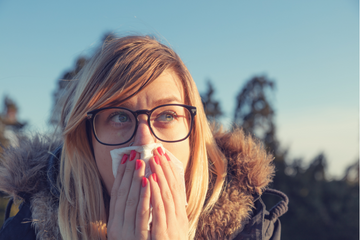Stress is a common experience for nearly everyone, often arising from the pressure of balancing numerous tasks within limited timeframes. Especially for active adults, stress seems almost inevitable. It can emerge from various life events, both positive—like starting a new job, going on vacation, or getting married—and negative—such as job loss, divorce, or bereavement. Stress isn't merely about the event itself but rather how we psychologically or physically respond to it.
Accompanying stress is often anxiety, a tense sensation primarily focused on future uncertainties. While some anxiety can be motivating or helpful in dangerous situations, chronic anxiety can significantly disrupt daily life, making it challenging to find joy and fulfillment.
While most of us understand that stress affects our emotional and mental well-being, its impact on our physical health is equally significant. Each person may respond to stress differently, but common indicators include digestive issues, blood sugar regulation difficulties, elevated blood pressure and heart rate, weakened immunity, and chronic muscular or joint pain and inflammation.
However, stress need not dictate our lives or health. It's manageable. By cultivating and sustaining healthy habits, we can mitigate stress's effects and enhance our overall well-being. Incorporating routines like regular exercise, stretching, balanced nutrition, and quality sleep can markedly reduce stress levels and improve resilience.
In this article, we'll explore ten natural and effective methods to alleviate anxiety, empowering you to enhance your mental, emotional, and physical health.
1. Stay Physically Active
Regular physical activity is one of the most effective ways to combat anxiety. Almost any type of physical activity has the potential to act as a stress reliever, regardless of your fitness level or athletic background. Engaging in exercise can trigger the release of feel-good endorphins and other natural neural chemicals, enhancing your overall sense of well-being.
Additionally, exercise redirects your focus towards your body's movements, effectively improving your mood and allowing daily stressors to diminish. Whether it's going for a walk, jogging, gardening, cleaning, cycling, swimming, weight training, vacuuming, or any other activity that gets you moving, the benefits of physical activity for stress relief are abundant.
2. Practice Mindfulness and Meditation
Mindfulness and meditation practices help you stay grounded and present, reducing feelings of anxiety. During meditation, you direct your focus and quiet the barrage of thoughts that may clutter your mind, leading to stress. This practice can instill feelings of calm, tranquility, and equilibrium, benefiting both your emotional state and overall health. Meditation empowers individuals to cultivate their well-being.
Various forms of meditation, such as guided meditation, guided imagery, mindfulness, and visualization, can be practiced anytime and anywhere. For instance, you can meditate while taking a walk, commuting on public transportation, or waiting at a healthcare provider's office. Utilizing apps can assist in learning and practicing these techniques. Additionally, deep breathing exercises can be performed virtually anywhere.
3. Maintain a Healthy Diet
What you eat can impact your mood and anxiety levels. A balanced diet rich in fruits, vegetables, lean proteins, and whole grains can help maintain stable blood sugar levels and improve overall brain health. Foods high in omega-3 fatty acids, such as salmon, and magnesium-rich foods, like leafy greens, are particularly beneficial.
Every aspect of your health, including your mental well-being, is influenced by your diet.
In fact, according to this study in 2022, individuals who consume a diet rich in ultra-processed foods and added sugar tend to report higher levels of perceived stress.
Chronic stress may lead to overeating and a preference for highly palatable foods, which can have detrimental effects on both your physical health and mood.
Failure to consume an adequate amount of nutrient-dense whole foods can increase the risk of deficiencies in key nutrients essential for stress regulation and mood stability, such as magnesium and B vitamins.
Reducing the consumption of highly processed foods and beverages while increasing the intake of whole foods can help ensure proper nourishment for your body, potentially enhancing your ability to cope with stress.
4. Get Adequate Sleep
Excessive stress can disrupt your ability to fall asleep easily. When overwhelmed with tasks and thoughts, sleep quality can deteriorate. However, sleep is crucial for the restoration of both the mind and body. Most adults require between 7 to 9 hours of sleep nightly.
The duration and quality of your sleep profoundly impact your mood, energy levels, focus, and overall functionality. If you struggle with sleep issues, it's important to establish a serene and relaxing bedtime routine. This may include listening to calming music, ensuring the sleep environment is cool, dark, and quiet, minimizing screen time by stowing away phones and tablets, and adhering to a consistent sleep schedule.
5. Limit Caffeine and Alcohol
Certain individuals cope with stress by adopting unhealthy habits. These may involve excessive consumption of caffeine or alcohol, smoking, or resorting to illicit substances. These behaviors not only pose risks to your health but also exacerbate stress levels.
Both caffeine and alcohol have the potential to heighten anxiety. Caffeine often induces jitteriness and increased anxiety, while alcohol disrupts sleep patterns and overall mood stability. Taking steps to reduce or completely eliminate these substances from your diet can significantly alleviate symptoms of anxiety.
6. Connect with Friends & Loved Ones
Social support plays a pivotal role in maintaining mental health. Engaging in meaningful conversations with friends, family members, or within a supportive community can provide comfort and help alleviate anxious thoughts and feelings.
During periods of stress and irritability, the urge to withdraw and isolate oneself can be strong. However, reaching out to loved ones and nurturing social connections is essential. Even having just one supportive friend who listens attentively can profoundly impact your mood and bolster your resilience.
Social interaction acts as a potent stress reliever by offering distraction, emotional support, and a sense of belonging during life's adversities. Whether it's enjoying a coffee break with a friend, exchanging emails with relatives, or participating in community activities, these interactions can effectively alleviate stress and promote overall mental well-being.
7. Use Natural Supplements
Certain natural supplements have been identified for their potential to effectively alleviate anxiety symptoms. Omega-3 fatty acids, commonly found in fish oil, have demonstrated the ability to reduce anxiety levels in various studies. These essential fatty acids contribute to brain health and may help regulate neurotransmitter function, which plays a role in mood regulation.
Herbal supplements such as ashwagandha, valerian root, and chamomile are also recognized for their calming effects on the nervous system. Ashwagandha, known as an adaptogen, helps the body cope with stress by balancing cortisol levels. Valerian root is valued for its sedative properties, promoting relaxation and improving sleep quality. Chamomile, often consumed as a tea, has mild sedative effects that can soothe nerves and reduce anxiety.
It's crucial to prioritize safety when considering natural supplements for anxiety relief. Consulting with a healthcare professional before initiating any new supplement regimen is advisable, as they can provide personalized guidance and ensure compatibility with existing health conditions or medications. This proactive approach helps optimize the benefits of natural supplements while minimizing potential risks.
8. Practice Deep Breathing
Practicing breathing exercises can be a powerful technique for managing anxiety and promoting relaxation. Techniques such as deep breathing, diaphragmatic breathing, or belly breathing involve taking slow, deep breaths to activate the body's relaxation response. This helps calm the mind, reduce the physical symptoms of anxiety like rapid heartbeat and shallow breathing, and restore a sense of balance.
A simple yet effective exercise involves inhaling deeply through the nose, allowing the abdomen to expand fully, and then exhaling slowly through the mouth, releasing tension with each breath. Regular practice of these breathing exercises not only enhances immediate feelings of calm but also builds resilience to stress over time, making them a valuable tool in anxiety management strategies.
9. Engage in Creative Activities
Engaging in creative outlets can be a therapeutic way to alleviate anxiety and foster emotional well-being. Activities such as painting, drawing, writing, crafting, or playing musical instruments provide an avenue for self-expression and relaxation. Creative endeavors allow individuals to channel their thoughts and emotions into tangible forms, providing a sense of control and accomplishment.
Immersing oneself in creative pursuits can also serve as a distraction from anxious thoughts and worries, promoting mindfulness and a focus on the present moment. Whether it's through visual arts, writing poetry, knitting, or playing music, these outlets offer a cathartic release and an opportunity to explore and express feelings in a constructive and empowering manner.
Integrating creative activities into daily life can thus contribute significantly to managing anxiety and enhancing overall mental well-being.
10. Spend Time in Nature
Spending time in nature has been scientifically proven to have profound effects on lowering stress and anxiety levels. Engaging in activities such as hiking along scenic trails, gardening amidst plants and flowers, or simply taking a leisurely stroll in a nearby park can significantly enhance mood and foster a deep sense of calm. The combination of fresh air, natural sunlight, and the serene beauty of natural surroundings can be incredibly restorative for both the mind and body.
Studies suggest that exposure to green spaces and natural environments can reduce cortisol levels, the hormone associated with stress, while simultaneously boosting serotonin levels, which contribute to feelings of happiness and well-being.
Nature also provides a welcome break from the hustle and bustle of daily life, offering a peaceful retreat where individuals can unwind, recharge, and reconnect with themselves. Integrating regular doses of nature into one's routine can thus serve as a potent antidote to stress and anxiety, promoting overall mental and emotional health.
Managing Stress and Enhancing Well-being, Naturally.
While dealing with anxiety and stress can be challenging, incorporating these natural methods into your lifestyle can help manage and reduce symptoms. Regular physical exercise not only enhances physical health but also promotes the release of endorphins, neurotransmitters that help elevate mood and reduce stress.
Mindfulness practices, such as meditation and deep breathing exercises, offer powerful tools to cultivate present-moment awareness and calm the mind, fostering resilience against anxiety triggers.
A balanced and nutritious diet rich in antioxidants, omega-3 fatty acids, and vitamins supports brain health and mood stability, while ensuring adequate hydration contributes to overall well-being.
Prioritizing sufficient sleep allows the body to recharge and rejuvenate, crucial for mental clarity and emotional resilience. Additionally, maintaining strong social connections and seeking support from loved ones or community networks provides invaluable emotional reinforcement during challenging times.
As always, it is essential to seek guidance from a healthcare professional before initiating any new treatments or significant lifestyle changes, ensuring personalized advice tailored to individual needs. By adopting these holistic approaches, you can proactively manage anxiety and cultivate a foundation for enhanced overall natural well-being.
Stay #SHIELDSTRONG Everyone!







